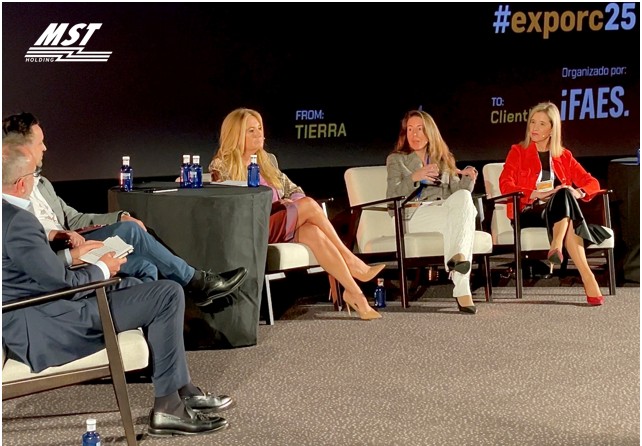During Expo Relación Cliente 2025, organized by IFAES, the round table “From BPO to KPO (Knowledge Process Outsourcing) to become an Experience Partner” took place.
Among the speakers, we would like to highlight the participation of Jessica Barceló, CEO of MST Holding, who offered an inspiring perspective on how companies in the sector are evolving toward models based on knowledge, technology, and human purpose.
“Change is not only operational, it is cultural.”
Jessica explained how MST Holding has evolved from a people-intensive organization to a company where technology, analytics, and specialized talent coexist to drive clients’ transformation.
“The creation of an ecosystem where talent, technology, and analytics integrate to enhance our clients’ capabilities is the true core of change” she stated.
For Barceló, the key lies in consistency:
“Trust is earned through transparency and coherence. At MST, we work around three pillars: consistency in resources, in technology, and in delivery.”
From Data to Value
The executive shared examples of how MST is applying its own artificial intelligence models in sectors such as pharmaceuticals and banking, achieving performance improvements of up to 40%.
“Our advantage is that the technology is proprietary, allowing us to ensure traceability, reliability, and regulatory compliance,” she explained.
Beyond efficiency, the goal is to turn data into useful knowledge — capable of enabling intelligent decisions and improving customer experience.
Technology with Empathy
Jessica emphasized that technology does not replace human value but amplifies it:
“Empathy, emotional understanding of the customer, and context interpretation will always be irreplaceable.”
For this reason, MST promotes the role of the Experience Consultant, a profile that combines analytical thinking and human sensitivity to provide strategic value in every interaction.
Spain, a European KPO benchmark
In the final part of the session, Barceló highlighted Spain’s role as a hub of knowledge and trust within the KPO landscape.
“We have a culture of compliance, economic stability, and well-prepared talent. But we must continue investing in technological and digital training.”
She advocated for the importance of reskilling and collaboration between companies, universities, and public institutions to face the future with confidence.
Towards a Shared Knowledge Model
Jessica concluded her speech with a statement that perfectly summarizes the essence of this new paradigm:
“The real change is not in what we do, but in how we do it. From providers to partners. From tasks to value. From execution to knowledge.”
A Final Reflection
The round table made it clear that the sector has entered a new stage: one of shared knowledge, collaboration, and applied intelligence.
The contributions from the various speakers — from Ilunion’s operational expertise to Zelenza’s technological vision or Atento’s strategic perspective — all agreed on one essential point: the evolution from BPO to KPO is not a trend, but a structural transformation redefining how companies create value alongside their clients.
The debate, ultimately, reflected the maturity of the industry: a sector that no longer just executes, but thinks, analyzes, co-creates, and supports. And that evolution — as demonstrated at Expo Relación Cliente 2025 — is already underway.

